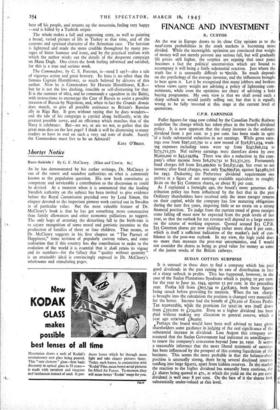FINANCE AND INVESTMENT
By CUSTOS
As the war in Europe draws to its close City opinion as to the neat'-term probabilities in the stock markets is becoming more divided. While the incorrigible optimists are convinced that weight of money will not merely prevent any serious fall, but will gradually lift prices still higher, the sceptics are arguing that once peace becomes a fact the political uncertainties which are bound to accom,pany it will bring a fairly substantial reaction. Just where the truth lies it is unusually difficult to 1:lecide. So much depends on the psychology of the average investor, and the influences brought to bear upon it. Let it be recognised that man); jobbers and brokers whose views carry weight are advising a policy of lightening' com- mitments, while even the optimists are chary of advising a bold buying programme. My own view is that we shall avoid such a sharp setback as would justify selling out, but that it is equally wrong to be fully invested at this stage at the current level of quotations.
• C.P.R. EARNINGS
Fuller figures for 1944 now cabled by the Canadian Pacific Railway underline the change which has taken place in the board's dividend
policy. It is now apparent that the sharp increase in the ordinary dividend from 2 per cent. to 5 per cent. has been made in spite Of a fairly substantial reduction in net earnings. While gross earn- ings rose from $297,107,791 to a new record of $318,871,034, work- ing expenses including taxes were up from $247,896,224 to $275,711,370. Net" railway earnings were therefore down by over $6,000,000 to $43;159,664. There was also a reduction in the com- pany's other income from $16,270,751 to $12,371,315. Fortunately fixed charges fell from $22,499,600 to $20,831,149, but even• so net income; after fixed charges, was only $34,699,830, against $42,982,718 for 1943. Deducting the Preference dividend requirement one arrives at a figure of net earnings -available equivalent to roughly $2.20 on the $25 Common shares, or about 81 per cent. ' As I explained a fortnight ago, the board's more generous dis- tribution policy has been influenced by the fact that in the past Ordinary shareholders have received only the most Meagre returns on their capital, while the company has few maturing obligations during the next five years, imposing little or no strain on a strong financial position.. To judge from the current trend of gross receipts some falling off must now be expected from the peak levels of last year' so that the outlook for net revenue will depend to a large extent on the course of working expenses. Quoted around $15 $25 Common shares are now yielding rather more than 8 per cent., which is itself -a sufficient indication of the market's lack of con- fidence in the post-war outlook. In .my yiew, the high yield does no more than measure the post-war uncertainties, and I would not consider the shares as being as gOod value for money as some of the junior stocks of the British railways.- "
SUDAN COTTON SURPRISE
It is unusual in these days to find a company which his paid good dividends in the past raising its rate of distribution in face of a sharp setback in profits. This has happened, however, in the case of the Sudan-Plantations Syndicate which is paying 20 per cent. for the year to June 30, 1944, against 12 per cent. in the preceding year. Profits fell from £603,744 to £458,903, both these figures being struck before providing for taxation. When the tax charge is brought into the calculation the position is changed very materially for the better. Income had the benefit of £82,100 of Excess Profits Tax recoverable, wjaile the provision for taxat:on was itself down from L350,000 to L234,030. Even so a higher dividend has been /Said without making any allocation to general, reserve, which a year ago reteived £8o,000. Perhaps the board would have been well advised to have given shareholders some guidance in judging of the real significance of the substantial increase in dividend. Last August this company an- nounced that the Sudan GoVernment had indicated its unwillingness to renew the company's concession beyond June 30, 1950. It seems a reasonable inference that the, more liberal treatment of earnings has been influenced by the prospect of this coming liquidation of the business. This seems the more probable in that the balance-sheet position is unusually strong, there being several disclosed reserves runfung into large figures, apart from hidden reserves- In theanarket the reaction to the higher dividend has naturally been cautious, the £1 shares being quoted at 47s., at which the yield on the 20 per cent. . dividend, is well Over 8 per cent. On- the face of it the shares look substantially under-valued at this level.


























 Previous page
Previous page